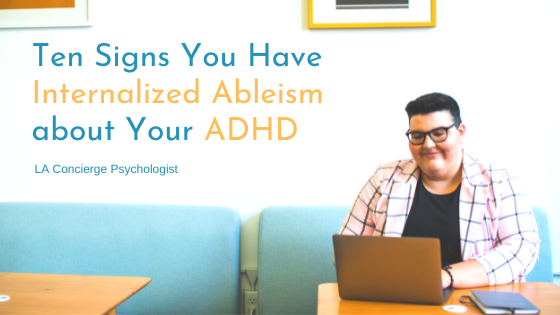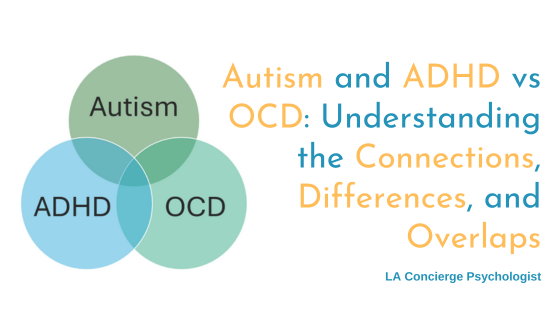Ableism is a destructive social attitude, like racism, that creates significant trauma for people with disabilities. But what is ableism? The definition of ableism is the beliefs or practices that devalue and discriminate against people with disabilities, assuming that they need to be ‘fixed’ or adapt to their environments, instead of the environments supporting them. Ableism is imbedded in our society and is the basis of many limiting beliefs about what disability does or does not mean. It informs how able-bodied people learn to treat people with disabilities and how much value is placed on functioning ‘normally’ instead of naturally.
When you internalize ableism, it becomes more destructive. The ableist beliefs you’ve heard all your life become part of your narrative, and you turn that judgment and condemnation in on yourself. Ableism is always bad, but it’s at its worst when it’s being used by someone who knows all your weaknesses: you.
The Importance of Recognizing Internalized Ableism
When you recognize your internalized ableism, you can become a force for positive change. Instead of automatically accepting the ableist narrative you tell yourself, you can begin to push back against it. You will more quickly identify situations where you’re experiencing discrimination, because you won’t be unknowingly participating in your oppression. You will have an easier time learning how to engage with self-compassion, and you will finally be able to live as your true, authentic self. Your authenticity and self-acceptance will influence your environment, and the changes you make in your own thinking will educate and hopefully change the people around you. This is one major way to fight ableism in society
Internalizing ableism does not make you a bad person. It is a trauma response to living in an ableist world that constantly devalues you and makes you feel guilty for who you are. But it’s still important to recognize it and work on it so you can live a life of self-acceptance.
Signs of Internalized Ableist Beliefs as an ADHD-er
1. You think you’re lazy
It’s hard keeping up with daily living tasks like cleaning and bills, and you assume you’re a lazy person. You frequently feel exhausted and anxious about the daily tasks you wanted to get done but couldn’t. Instead of recognizing this as part of your ADHD struggles, you believe your challenges are a moral failing. It’s easier to say you’re lazy, rather than accepting that executive functioning challenges are a very common struggle for adults with ADHD and are just a part of the neurotype.
2. You think you are ‘too much’
Does meeting new people give you anxiety because you’re afraid of overwhelming them? Do you criticize yourself for talking a lot or expressing a lot of emotion? Ableist beliefs condemn the exuberance that often comes with ADHD because it presents outside the norms of neurotypical social behavior. There are people who will love the spark that makes you such a lively and interesting person. However, you try to hide, rather than openly being yourself, because you believe that’s the only way people will love and accept you.
3. You won’t accept you have ADHD
Even after you realize that every meme, blog, and lived-experience account of ADHD is telling your life story, it is still easier to believe you are just a lazy disaster of a person rather than accepting that you’re and ADHD-er. You might even feel this way after getting a professional diagnosis because you’ve been told that your challenges are your fault and you’re dodging responsibility if you find another cause.
4. You don’t think you should need medication
Your coping strategies for your diagnosed ADHD aren’t working, but you don’t want to try medication because it seems like cheating. Maybe you’ve swallowed the narrative that ADHD is wildly over-medicated and stimulants are bad. You think you should be able to function like a neurotypical person without it. If you can’t, it’s just because you’re not trying hard enough, and you deserve to struggle. (Side note: Medication is not for everyone. But that should be a personal choice and should not be made based on these ableist beliefs.)
5. You won’t ask for accommodations
You would do better if you had more time on tests, a quieter office, or some flexibility with deadlines. But instead of asking for changes in your environment, you continue struggling through because everybody else does these things without accommodations, so you should too. Just like with medication and diagnosis, we learn that our problems are our responsibility versus a mismatch of our natural abilities and the environment. Rather than working with your specific support needs and becoming a better, or at least happier worker, you’ve learned that it’s better to suffer rather than feel like you’re getting help you don’t deserve.
6. You take all the burdens of adapting to a situation, rather than insisting the situation accommodate you
If you do ask for accommodations, you might still think putting them in place is entirely your responsibility. You don’t recognize that you need accommodations because the environment was inaccessible for someone with ADHD in the first place. Meaning, making things more accesible should be a collaborative effort.
7. You think you don’t deserve compassion from yourself or others
Here we are, back at the idea that every challenge or need you have is your responsibility and your fault. This is the core of ableism in society. When you make mistakes that are influenced by your ADHD, you feel like you deserve compassion, internally or externally. You might believe everyone deserves compassion, but you also think you’re the exception to the rule.
8. You think you can, and should, cure your ADHD
Maybe you accept your ADHD diagnosis, but you view it as something to cure and get rid of. You constantly hear about the negative aspects of ADHD, and you take the criticism to heart instead of accepting yourself. Rather than having a more balanced view of your ADHD, you’d much rather erase that part of you because…
9. You’ve never even considered the gifts that come with ADHD
ADHD comes with some great traits. Many ADHD-ers are highly creative and curious and can see patterns where others can’t. Folks with ADHD can also often use their ability to hyperfocus to be extremely productive and master certain subjected. Unfortunately, because of the ableism surrounding you has taught you to focus on your flaws, you can’t see the strengths in yourself. Even if you do, you feel like you have them despite your ADHD, not because of it.
10. You embrace toxic perfectionism
Everyone told you how lazy or disorganized you were. Instead of finding coping mechanisms that worked with your brain and made life easier, you became a perfectionist and made it your identity instead. You drive yourself to exhaustion trying to fulfill unrealistic expectations. Your mental health is sacrificed so you’ll fit in and keep up, instead of learning your own needs and boundaries so you can operate in a way that’s sustainable for you.
Push Back Against Internalized Ableism
Ableism is disability discrimination. When it comes from inside you, it does an unbelievable amount of damage to your sense of self-worth and your identity. Your ADHD is a part of you. It influences how you perceive and interact with the world, your approach to doing things, and your needs. Your ADHD identity is valid.
You are not a bad person for dealing with internalized ableism; you’ve adopted the belief system of our ableist society because you probably never had anyone tell you differently. But it’s important to recognize and dismantle ableist beliefs about ADHD. Society will make it difficult for you as someone with ADHD, but you don’t have to help them. When you begin unlearning ableist beliefs you will start understanding yourself and your needs, and learn how to live as your authentic self.
With the support of a neurodiversity-affirmative adult ADHD specialist, you can begin to recognize and push back on your internalized ableism. Additionally, our ADHD therapists can provide you with ways to leverage your ADHD gifts instead of just focusing on your ADHD struggles.
Send us a message to see how we can help or book a free 20 minute consultation call with Dr. Barajas or Dr. Goldman.




